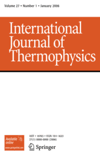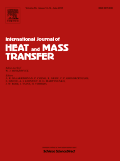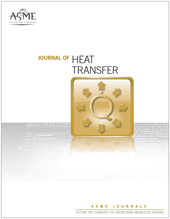
Journal of Thermal Science
Scope & Guideline
Fostering groundbreaking research in thermal applications.
Introduction
Aims and Scopes
- Heat Transfer Mechanisms:
The journal covers a wide range of topics related to heat transfer mechanisms, including conduction, convection, and radiation. Research articles often explore innovative methods to enhance heat transfer efficiency in various applications. - Thermal Management in Engineering:
There is a significant emphasis on thermal management systems in engineering applications, particularly in electronics cooling, automotive, and aerospace industries. Studies focus on optimizing cooling systems and developing novel materials to improve thermal performance. - Phase Change Materials and Thermal Energy Storage:
Research on phase change materials (PCMs) and their applications in thermal energy storage systems is a core area of focus. The journal publishes articles that explore the thermal properties, modeling, and performance of PCMs in various contexts. - Nanofluids and Hybrid Materials:
The use of nanofluids and hybrid materials for enhanced thermal performance is a growing area of interest. The journal encourages studies that investigate the thermal properties and applications of nanofluids in heat exchangers and other thermal systems. - Computational Fluid Dynamics (CFD) Applications:
Many papers employ computational fluid dynamics (CFD) to simulate and analyze thermal and fluid flow phenomena. This includes modeling complex geometries and conditions to predict heat transfer behaviors in various systems. - Experimental Techniques in Thermal Science:
The journal promotes the use of advanced experimental techniques to investigate thermal phenomena, including infrared thermography, laser-based methods, and other innovative measurement techniques.
Trending and Emerging
- Machine Learning and AI in Thermal Science:
There is a notable increase in research integrating machine learning and artificial intelligence to predict thermal behaviors and optimize thermal systems. This trend showcases the journal's embrace of modern computational techniques to enhance traditional thermal science. - Sustainable and Renewable Energy Applications:
Research related to sustainable energy solutions, such as solar thermal systems and energy storage technologies, is on the rise. This reflects a broader societal push towards renewable energy and efficient thermal management systems. - Advanced Cooling Technologies:
Innovative cooling technologies, including hybrid cooling systems that combine different cooling methods (e.g., liquid, air, and phase change), are increasingly featured. These studies aim to improve thermal management in high-performance applications. - Thermal Management in Electronics:
As electronic devices become more powerful and compact, research dedicated to thermal management solutions in electronics is expanding. This includes studies on novel heat sink designs, thermal interface materials, and cooling systems tailored for specific applications. - Nanotechnology in Thermal Applications:
The application of nanotechnology in enhancing thermal properties of materials is gaining popularity. Research focuses on the development and characterization of nanofluids and nanostructured materials for improved heat transfer.
Declining or Waning
- Traditional Heat Exchanger Designs:
Research on conventional heat exchanger designs has seen a decline as newer technologies and materials, such as microchannels and nanofluids, gain more attention. The focus has shifted towards optimizing these advanced systems rather than improving traditional designs. - Basic Thermodynamics:
Studies that cover fundamental thermodynamic principles without a clear application or innovative approach have become less common. The journal's audience seems to favor research that offers practical solutions or advancements in thermal science. - Single-Phase Cooling Techniques:
Research focused solely on single-phase cooling techniques is waning, as there is increasing interest in two-phase cooling systems and hybrid cooling strategies that provide better thermal management. - Non-advanced Materials:
Research utilizing non-advanced or traditional materials for thermal applications is declining. There is a shift towards exploring novel materials, composites, and nanomaterials that offer superior thermal properties.
Similar Journals

HEAT TRANSFER RESEARCH
Connecting Theory and Practice in Heat TransferHEAT TRANSFER RESEARCH is a leading academic journal published by Begell House Inc that focuses on the dynamic and evolving fields of heat transfer, fluid flow, and mechanical engineering. With an ISSN of 1064-2285 and an E-ISSN of 2162-6561, this journal serves as a critical platform for researchers and professionals seeking to disseminate innovative findings and advancements in these interrelated disciplines. Covering converged years from 1992 to 2024, HEAT TRANSFER RESEARCH has established its impact in the academic community, achieving a 2023 ranking of Q3 in Condensed Matter Physics and Q2 in Fluid Flow and Transfer Processes. It currently occupies a percentile rank ranging from 44th to 54th across several Scopus categories, underscoring its relevance and contribution to the scientific discourse. While Open Access options are not available, the journal remains committed to providing high-quality research and insights that shape the future of thermal sciences. Accessible to both seasoned professionals and aspiring students, HEAT TRANSFER RESEARCH is indispensable for anyone looking to stay ahead in the ever-changing landscape of engineering and applied physics.

Case Studies in Thermal Engineering
Advancing the Frontiers of Thermal Engineering ResearchCase Studies in Thermal Engineering, published by ELSEVIER, stands as a premier platform for innovative research and analysis in the field of thermal engineering since its inception in 2013. With a robust Open Access model, this journal ensures that groundbreaking findings in fluid flow and transfer processes are readily accessible to a global audience, fostering collaboration and knowledge sharing across disciplines. Situated in the United Kingdom, the journal boasts an impressive impact factor, reflecting its status in the first quartile (Q1) for both engineering (miscellaneous) and fluid flow and transfer processes, as noted in the latest Scopus rankings. Researchers and professionals alike recognize its significance, ranking 9th out of 96 in Chemical Engineering and achieving a notable 91st percentile in its category. By publishing high-quality case studies, the journal aims to advance understanding and applications of thermal engineering principles, making it an essential resource for those looking to stay at the forefront of this dynamic field.

INTERNATIONAL JOURNAL OF THERMOPHYSICS
Illuminating the Path of Thermal ResearchInternational Journal of Thermophysics, published by Springer/Plenum Publishers, is a premier platform for the dissemination of high-quality research in the field of thermophysics, particularly focusing on the intricate relationships between thermal properties and their applications across various scientific disciplines. With an ISSN of 0195-928X and an E-ISSN of 1572-9567, the journal has established a respected presence in the academic community since its inception in 1980, with a converged publication timeline extending to 2024. Categorized in the Q2 quartile for Condensed Matter Physics in 2023 and maintaining impressive Scopus rankings—such as #39 in Fluid Flow and Transfer Processes and #178 in Condensed Matter Physics—the journal serves as a vital resource for researchers and professionals aiming to advance knowledge in the thermal sciences. Though not an open-access journal, it remains accessible through institutional subscriptions. The International Journal of Thermophysics is committed to fostering innovative research and interdisciplinary collaboration, ensuring that it remains at the forefront of thermophysical studies.

ISI Bilimi ve Teknigi Dergisi-Journal of Thermal Science and Technology
Exploring the Frontiers of Thermal Science and TechnologyISI Bilimi ve Teknigi Dergisi-Journal of Thermal Science and Technology, published by the Turkish Society of Thermal Sciences and Technology, serves as a pivotal platform for disseminating cutting-edge research in the fields of thermal science, engineering, and materials science. With an ISSN of 1300-3615, this journal not only addresses critical advancements from 2008 to 2013 and 2015 to 2023, but also operates under the auspices of rigorous peer review, contributing to its reputable standing in academia. As a Q4 ranked journal in various disciplines including Atomic and Molecular Physics, Engineering, and Materials Science, it offers researchers and professionals essential insights, though it does not currently operate under an open access model. Situated in Ankara, Turkey, this journal is key to fostering collaboration and innovation among scholars, making it an indispensable resource for students and professionals eager to engage with the latest thermal science methodologies and technologies.

Archives of Thermodynamics
Exploring the Dynamics of Energy and MatterArchives of Thermodynamics is a reputable journal dedicated to the field of thermodynamics, published by the esteemed POLISH ACADEMY OF SCIENCES. With a robust history since its inception in 2003, this journal serves as a critical platform for disseminating high-quality research aimed at advancing knowledge and technology in thermodynamic systems and processes. Recognized for its contribution to the field, it holds a Q3 ranking in the Physics and Astronomy (miscellaneous) category as of 2023, with a respectable Scopus rank of #148 out of 243, placing it within the 39th percentile. Although it follows a traditional access model, the journal's commitment to scholarly excellence ensures that researchers, professionals, and students alike can benefit from its rich archives and ongoing discussions within the scientific community. Situated in Warsaw, Poland, the journal not only reflects a regional dedication to scientific progress, but also engages with global audiences interested in the evolving landscape of thermodynamic research.

INTERNATIONAL JOURNAL OF HEAT AND MASS TRANSFER
Exploring Innovations in Fluid Flow and Transfer ProcessesINTERNATIONAL JOURNAL OF HEAT AND MASS TRANSFER is a premier, peer-reviewed academic journal published by PERGAMON-ELSEVIER SCIENCE LTD, focusing on the vital fields of condensed matter physics, fluid flow, and transfer processes, as well as mechanical engineering. With an impressive impact factor and consistently ranked in the Q1 quartile across multiple engineering and physics categories, this journal stands out for its rigorous scholarship and relevance to advancements in heat and mass transfer phenomena. Spanning from 1960 to 2024, it serves as a critical platform for researchers and professionals aiming to disseminate innovative findings and foster cutting-edge discussions in these interconnected domains. Though it operates on a subscription model, readers benefit from a comprehensive archive that covers seminal studies and contemporary advancements. Academics and practitioners alike can deepen their understanding of the complex interplay between heat and mass transfer, which is essential for numerous applications in engineering and scientific research.

JOURNAL OF HEAT TRANSFER-TRANSACTIONS OF THE ASME
Innovating the Future of Mechanical Engineering.JOURNAL OF HEAT TRANSFER-TRANSACTIONS OF THE ASME, with ISSN 0022-1481 and E-ISSN 1528-8943, is a leading publication in the field of heat transfer, mechanical engineering, and related disciplines, published by the renowned American Society of Mechanical Engineers (ASME). This esteemed journal, which has been in circulation since 1945, provides a platform for novel research findings and reviews that the mechanical engineering community can rely upon, contributing significantly to the advancement of knowledge in heat transfer processes. The journal is recognized for maintaining a strong impact in several categories, attaining Q2 quartile rankings in Condensed Matter Physics, Mechanical Engineering, and Mechanics of Materials, reflecting its influential role in shaping scientific dialogues. With a commendable Scopus ranking, including a percentile of 63rd in Mechanical Engineering, it attracts submissions from leading researchers and industry professionals alike. Although access options are currently undergoing changes, the commitment to disseminating cutting-edge research remains steadfast. Gathering insights from historical and contemporary studies, the JOURNAL OF HEAT TRANSFER stands as a vital resource for those aiming to innovate in heat transfer technologies and methodologies.

Heat Transfer
Advancing thermal science for a sustainable future.Heat Transfer, published by WILEY, is a leading open-access journal dedicated to advancing the field of heat transfer science, encompassing innovative research and application across various domains. With an ISSN of 2688-4534 and an E-ISSN of 2688-4542, the journal aims to provide a platform for researchers to disseminate their findings from 2020 to 2024, focusing on condensed matter physics and fluid dynamics. Ranked in the Q2 category for both Condensed Matter Physics and Fluid Flow and Transfer Processes, it showcases articles that contribute significantly to the understanding and utilization of heat transfer mechanisms. Located in the United States at 111 River St, Hoboken, NJ 07030, the journal appeals to a diverse audience, including academic researchers, professionals in engineering, and students seeking to deepen their knowledge in thermal sciences. With a strong emphasis on accessibility, Heat Transfer promotes the exchange of ideas and experimental techniques, ultimately driving innovation and collaboration in the advancement of thermal management technologies.

THERMAL ENGINEERING
Leading the Charge in Energy and Thermal ResearchTHERMAL ENGINEERING is a premier journal dedicated to advancing the field of thermal engineering, with particular importance in the domains of Energy Engineering, Nuclear Energy, and Power Technology. Published by PLEIADES PUBLISHING INC, this esteemed journal has been providing significant scholarly contributions since its inception, with its converged years spanning from 1970 to 2024. Though currently non-open access, the journal presents a unique avenue for researchers, professionals, and students to explore groundbreaking research and innovative solutions related to energy systems and thermal processes. With a notable impact factor and positioned in the Q3 quartile for both Energy Engineering and Nuclear Energy, THERMAL ENGINEERING ensures the dissemination of high-quality research with a global reach, making it an essential resource for those looking to stay at the forefront of essential energy technologies and engineering advancements.

HEAT AND MASS TRANSFER
Bridging gaps in knowledge with cutting-edge research.HEAT AND MASS TRANSFER is a prestigious peer-reviewed journal published by Springer, dedicated to advancing the understanding of thermal and mass transfer phenomena in various physical and engineering contexts. With an ISSN of 0947-7411 and an E-ISSN of 1432-1181, this journal has established itself as a key platform for researchers and professionals in the fields of Condensed Matter Physics and Chemical Engineering, achieving a commendable Q2 ranking in both categories as of 2023. The journal also holds impressive positions on Scopus, being ranked #147 out of 434 in Condensed Matter Physics and #33 out of 96 in Fluid Flow and Transfer Processes, both in the 66th percentile. Covering innovative research and practical applications from its inception in 1995 through to 2024, HEAT AND MASS TRANSFER is crucial for those aiming to deepen their knowledge and stay updated on the latest advancements in heat and mass transfer research. While the journal does not offer open access, its rigorous content is essential for researchers seeking to contribute to and benefit from scholarly discourse in this vital area of science.